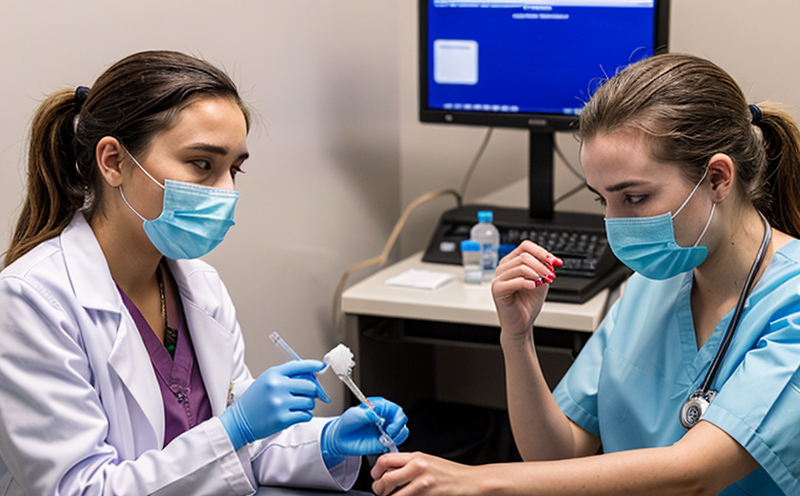EN ISO 15189 Clinical Microbiology Laboratory Accreditation Testing
The EN ISO 15189 standard is a global benchmark for quality management systems (QMS) in healthcare organizations, particularly laboratories. This accreditation ensures that clinical microbiology labs adhere to the highest standards of accuracy, reliability, and consistency in testing. Achieving EN ISO 15189 certification demonstrates a laboratory's commitment to excellence and trustworthiness within the healthcare sector.
Clinical microbiology involves the study and identification of microorganisms associated with human disease. The laboratory plays a critical role in diagnosing infections, identifying pathogens, and guiding treatment decisions. To ensure that these tests are accurate and reliable, laboratories must adhere to stringent protocols and standards such as EN ISO 15189.
The accreditation process under EN ISO 15189 encompasses several key areas:
- Quality management system
- Personnel qualification and competency
- Test methods and reagents
- Patient sample handling
- Data analysis and reporting
- Continuous improvement and monitoring
The process begins with a comprehensive audit of the laboratory's processes, followed by an on-site inspection. This ensures that all aspects of the lab’s operations comply with the stringent requirements outlined in EN ISO 15189. Once the audit is complete, the laboratory can apply for accreditation.
Accreditation under this standard provides several benefits to healthcare organizations:
- Enhanced patient safety and satisfaction
- Improved diagnostic accuracy and reliability
- Increased credibility and trust within the medical community
- Compliance with international standards, facilitating easier international collaboration
- Reduction in errors and rejections of test results
The process also fosters a culture of continuous improvement, ensuring that the laboratory remains at the forefront of diagnostic excellence.
Scope and Methodology
EN ISO 15189 accreditation in clinical microbiology testing covers a broad range of activities within a clinical laboratory. This includes specimen collection, preparation, and handling; the use of appropriate diagnostic methods and reagents; the performance of tests; data analysis; reporting results; and follow-up actions.
The scope is designed to ensure that all aspects of microbiology testing are conducted in a standardized manner. This includes:
- Microbial identification
- Detection of drug resistance
- Viral cultures and serological tests
- Bacterial, fungal, and parasitic isolation
- Antimicrobial susceptibility testing
The methodology involves rigorous validation and verification of test procedures. This ensures that all tests are accurate, reproducible, and consistent with international standards.
Instrumentation used in clinical microbiology laboratories includes:
- Microscopes
- Culture media
- Viral transport media
- Antimicrobial susceptibility testing systems
- Liquid-based culture systems
Data analysis and reporting are critical components of the process. Results must be accurate, clear, and presented in a manner that facilitates timely clinical decision-making.
Benefits
The benefits of EN ISO 15189 accreditation extend far beyond compliance with regulatory requirements. It provides a framework for excellence in laboratory practice, enhancing patient safety and satisfaction while also improving diagnostic accuracy and reliability.
Patient safety is paramount in healthcare settings. By adhering to the strict standards outlined in EN ISO 15189, laboratories can minimize errors and ensure that test results are accurate and reliable. This leads to better-informed clinical decisions, which ultimately improve patient outcomes.
The accreditation process also ensures that personnel are adequately trained and competent in their roles. This enhances the overall quality of testing and reporting, ensuring that all results are accurate and consistent with international standards.
Compliance with EN ISO 15189 facilitates easier international collaboration by ensuring that laboratories meet the same high standards worldwide. This is particularly important in a globalized healthcare environment where cross-border patient care and research are increasingly common.
The process also fosters a culture of continuous improvement, encouraging laboratories to regularly review and refine their processes. This ensures that they remain at the forefront of diagnostic excellence, continuously seeking ways to enhance accuracy and reliability.
Industry Applications
- Hospital laboratories providing diagnostic services for inpatients and outpatients
- Reference laboratories offering specialized testing services
- Diagnostics companies developing new tests and treatments
- Research institutions conducting clinical trials
- Public health agencies monitoring infectious diseases
The EN ISO 15189 standard is particularly relevant for hospital laboratories, where the accuracy of test results can have a significant impact on patient care. By adhering to this standard, hospitals ensure that their microbiology labs provide reliable and accurate diagnostic information.
Reference laboratories also benefit from EN ISO 15189 accreditation, as it ensures that they maintain high standards of quality across all testing procedures. This is especially important for specialized tests that may be used in diagnosing rare or complex conditions.
Diagnostics companies can use the standard to guide the development and validation of new tests, ensuring that they meet the highest standards of accuracy and reliability before being offered to the market.





